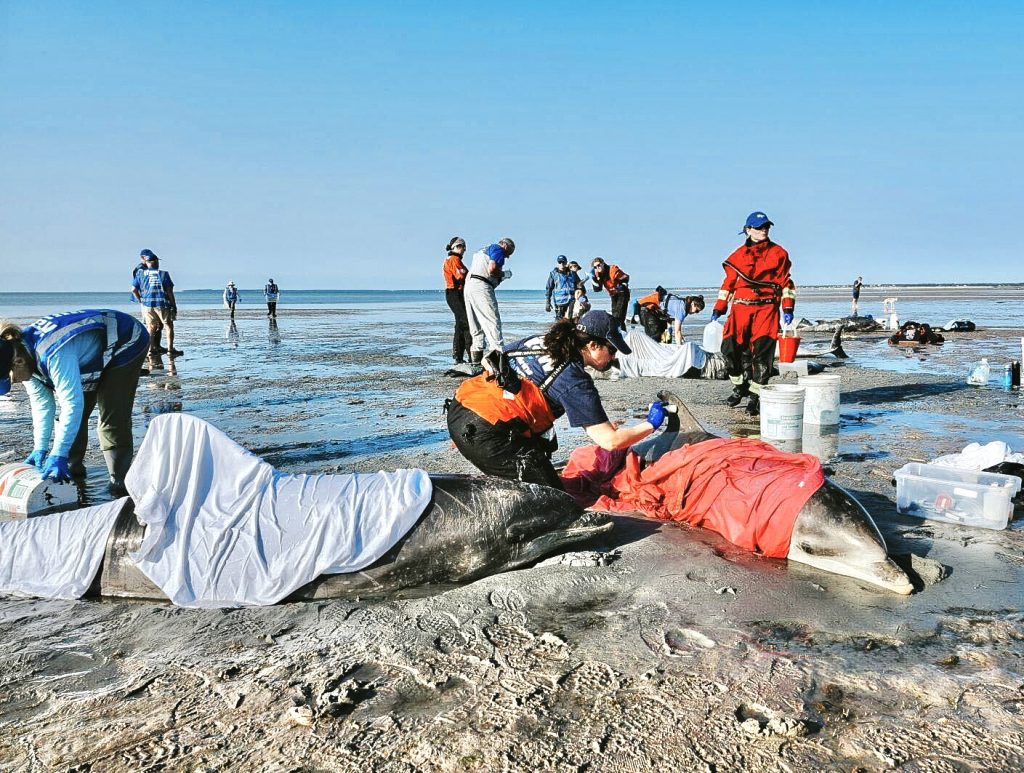Photos by: IFAW
Last week, a leading Cape Cod-based marine mammal rescue team responded to a large-scale stranding of bottlenose dolphins along the shores of Brewster, Massachusetts.
A total of 14 dolphins became stranded on September 16th at Linnell Landing in Brewster. Sadly, three were confirmed dead, while efforts continued to refloat the remaining 11 animals as the tide rose. According to IFAW, this marked the largest mass stranding of bottlenose dolphins in the Northeast region.
“Upon arrival, 11 dolphins were still alive, and the team immediately began preparing to refloat them with the changing tide,” said Kira Kasper, Biologist and Animal Responder at IFAW. “In just the last two weeks, we have responded to 26 dolphin strandings, both common and bottlenose, so we have been on high alert and monitoring their movements closely.”
Monday’s dolphins were marked with temporary identification tags and one dolphin was fitted with a temporary satellite tag to track its movements post-release. On Tuesday morning, that satellite tag helped alert responders that the dolphins had restranded in Wellfleet. IFAW was immediately on-site with its mobile dolphin rescue unit, a vehicle custom-built for the rescue and transport of dolphins.
“Just before 7 AM the next morning, we learned that all 11 dolphins had restranded at Lieutenant Island in Wellfleet,” reported Kasper. “The tide was incoming until 11:16 AM, but the dolphins could not be released where they stranded. Our team moved quickly to extract the animals from treacherous mud, provide necessary health assessments and treatments, and transport the dolphins to Herring Cove in Provincetown, where they were all released back to the ocean.”
Cape Cod’s unique topography makes it a common location for marine mammal strandings, particularly for species like dolphins. Shallow waters, complex tidal movements, and sandbars often disorient dolphins, leading them to strand in large numbers. IFAW’s rescue work is vital in this region, where strandings are not only frequent but sometimes large in scale, as evidenced by this week’s event.
Over the years, IFAW has recorded an increase in the number of bottlenose dolphin strandings, but this is the first time the team has encountered such a large group of this species stranded in the area. This offshore species tends to be larger and more robust than its coastal counterparts and is typically found farther from shore.
“This mass stranding comes toward the end of an unprecedented summer for our team due to the sheer number of dolphin strandings. Since the end of June, the team has responded to 175 live stranded dolphins, which is over 2.5 times our annual average,” Kasper added.
The success of these rescue efforts relies on collaboration between IFAW staff and trained volunteers. Teams worked tirelessly to ensure the safe return of these dolphins to the ocean.
IFAW remains dedicated to studying the causes of dolphin strandings to better understand and mitigate the risks to these marine mammals. Dolphins play an essential role in marine ecosystems, and every effort is made to safeguard their populations through rescue, research, and conservation. Monitoring the animals through temporary satellite tags provides crucial information about their movements and health post-release.
-
On Cape Code, or along the southern coast to RI, call or text IFAW’s Stranding Hotline at (508) 743-9548
-
For Plymouth, MA to Marshfield, MA: Whale and Dolphin Conservation at (617) 688-6872
-
Scituate, MA to Rockport, MA and Martha’s Vineyard: NOAA at (866) 755-6622.
-
New Hampshire to Essex, MA: Seacoast Science Center Marine Mammals Strandings at (603) 997-9448
-
Maine: Marine Mammals of Maine (800) 532-9551
-
Nantucket: Marine Mammal Alliance Nantucket (833) 667-6626
